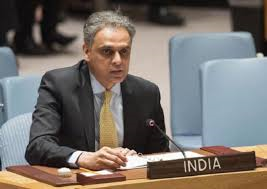 India has made a fresh bid to win permanent membership of an expanded UN Security Council and laced it with an offer to renounce veto power temporarily.
India has made a fresh bid to win permanent membership of an expanded UN Security Council and laced it with an offer to renounce veto power temporarily.
“The issue of veto is important but we should not allow it to have a veto over the process of Security Council reform itself,” India’s Permanent Representative at the UN Mr Syed Akbaruddin said in New York on March 7. Speaking on behalf of the Group of Four countries comprising Brazil, Germany, India, and Japan, Mr Akbaruddin said that while new permanent members would, in principle, have veto powers that the current five members US, Russia, China, France and Britain have, “they shall not exercise the veto until a decision on the matter has been taken during a review.”
The offer by India and the three other G4 countries to forgo the veto power temporarily in return for permanent membership in the UNSC is being seen by observers as a bargaining chip to get the much-awaited Council reforms process moving.
The Security Council, formed in 1945 in the immediate backdrop of the World War II, has five permanent members and ten non-permanent members which are elected for two-year terms.
India’s attempt to find a permanent seat in the UNSC in order to reflect its importance as a major global player and changed political and economic realities across the globe since World War II, has not made much headway due to the reluctance of existing P5 members to make way for aspiring powers. All P5 countries, except China, has declared support for India’s Security Council aspiration.
The G4 countries back each other’s candidatures for permanent seats in an expanded Security Council. They rejected a proposal to create a category of longer-term elected members of the UNSC as an apparent strategy to block the inclusion of new permanent members. Mr Akbaruddin contended that expanding only the non-permanent members’ categories would only worsen the “imbalance of influence” in the UNSC and tilt the balance in favour of an outdated body.
His comments came in response to Italy’s Permanent Representative to the UN, Sebastiano Cardi who suggested elected membership have longer terms than the current two years. He made the proposal on behalf of Uniting for Consensus, a 13-member group that includes Pakistan. Dismissing the proposal as “old hat”, Mr Akbaruddin said that it had been rejected in a conference in 1944 in Washington. Any proposal for UNSC reforms without an expansion of the number of the permanent seats does “grave injustice to Africa’s aspirations for equality”, he said.
The G4 also pointed out that the number and allocation of non-permanent seats have outlived their relevance since the UN was formed and the reform in 1965 when the number of non-permanent members was increased from six to 10. Mr Akbaruddin said 53 member-countries of Asia-Pacific group have only two elected seats in the Council while the 26-member Western Europe group get two.
Author Profile
- India Writes Network (www.indiawrites.org) is an emerging think tank and a media-publishing company focused on international affairs & the India Story. Centre for Global India Insights is the research arm of India Writes Network. To subscribe to India and the World, write to editor@indiawrites.org. A venture of TGII Media Private Limited, a leading media, publishing and consultancy company, IWN has carved a niche for balanced and exhaustive reporting and analysis of international affairs. Eminent personalities, politicians, diplomats, authors, strategy gurus and news-makers have contributed to India Writes Network, as also “India and the World,” a magazine focused on global affairs.
Latest entries
 DiplomacyJanuary 5, 2026India walks diplomatic tightrope over US operation in Venezuela
DiplomacyJanuary 5, 2026India walks diplomatic tightrope over US operation in Venezuela India and the WorldNovember 26, 2025G20@20: Africa’s Moment – The Once and Future World Order
India and the WorldNovember 26, 2025G20@20: Africa’s Moment – The Once and Future World Order DiplomacyOctober 4, 2025UNGA Resolution 2758 Must Not Be Distorted, One-China Principle Brooks No Challenge
DiplomacyOctober 4, 2025UNGA Resolution 2758 Must Not Be Distorted, One-China Principle Brooks No Challenge India and the WorldJuly 26, 2025MPs, diplomats laud Operation Sindoor, call for national unity to combat Pakistan-sponsored terror
India and the WorldJuly 26, 2025MPs, diplomats laud Operation Sindoor, call for national unity to combat Pakistan-sponsored terror







